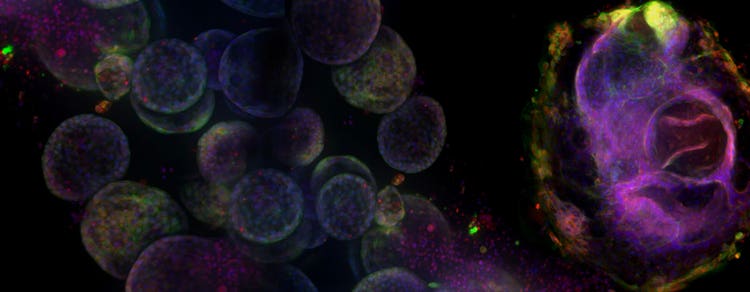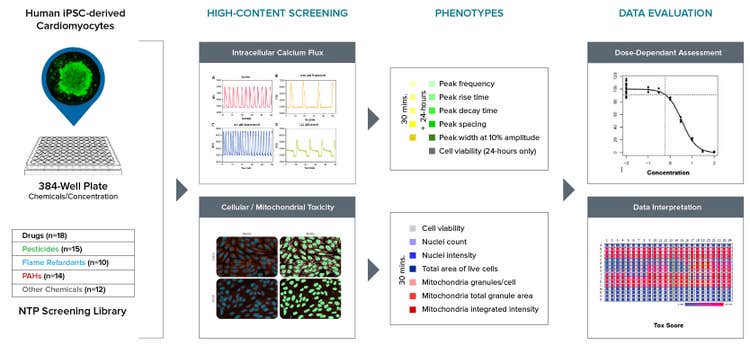
Toxicology
Using cell-based approaches for deeper toxicity assessment insights
What is toxicology?
Toxicology is the study of adverse effects of natural or man-made chemicals on living organism. It is a growing concern in our world today as we are exposed to more and more chemicals, both in our environment and in the products we use.
Many of these chemicals are known to be harmful to human health and there is evidence that they may be linked to a wide range of neurodevelopmental and neurodegenerative diseases such as Autism and Parkinsons.
Toxicology is therefore a vital science that helps us to navigate the ever-growing chemical landscape.
Safer and faster drug development with cell-based toxicity assessment methods
The study of toxic substances and their effects on living organisms is essential for developing safe medications and understanding the health consequences of exposure to toxic chemicals. Toxicologists work at the cutting edge of science, searching for new ways to identify and assess the risks posed by potentially harmful substances. In many cases, their work leads directly to improved public health and safety.
Toxicity assessment plays a critical role in the development of new drugs, as many potential treatments are found to be toxic in early clinical trials. In fact, over one-third of developing drugs fail due to toxicity, making early detection essential to bringing safe and effective treatments to market.
While toxicity testing on mice and rats is the standard method for assessing the safety of a new drug, there are limitations to this approach. Animal studies are slow as only a few compounds can be tested at a time. In addition, the physiology of humans is quite different from animals, so the results obtained are often not representative.
Shifting to cell-based testing allows for multiple chemicals to be tested rapidly and better represents human biology. 3D organoids are especially useful due to their high complexity and better resemblance to human tissue structure and function. Consequently, moving away from animal testing and towards cell-based methods could provide more accurate results, saving time, money, and most importantly, lives.
Cell-based toxicity assays
- Cell health assays
These can be performed in traditional cell culture format using cell lines or primary cells or by using more sophisticated iPSC stem cells. Cells are exposed to chemical substances in multiwell plates, and cell health and death can be evaluated using MTT assays, cell titer glow assays, plate reader assays, imaging methods, live-dead assays, and apoptosis assays. - Cell viability and morphology assays
Cells are assessed by imaging methods, where cell count, cell area, or nuclear shape can be used for the evaluation of potential toxic effects. - Neurite outgrowth
High content analysis can be used to detect cell death as well as measure neuronal growth and sprouting to evaluate and determine more complex toxic effects on neuronal cells. - Changes in cell organelles
Changes in nuclear shape, micronuclei, and disruption of mitochondria can be quantitated by using automated imaging and advanced imaging tools. These are sophisticated studies but provide excellent results. - E-Phys, CA2+ imaging and other functional assays
It’s important to detect impact of chemical substances on cell functionality. Many toxicants are ion channel blockers, therefore potential toxic effects can be detected by means of electrophysiology and calcium imaging.
Integrative in vitro assessment of cardiotoxicity
This workflow helps illustrate an integrative in vitro assay using human iPSC-derived cardiomyocytes for the high-throughput screening of several diverse classes of environmental chemicals and drugs (i.e. NTP screening library). Chemical effects on cardiomyocyte contractility were determined by Ca2+ flux measurements in combination with high-content imaging to evaluate concentration-dependent effects on cardiomyocyte physiology, mitochondrial membrane potential, and cell viability. Phenotypic descriptors were used for quantitative toxicity profiling. And for data evaluation, concentration values can be utilized for bioactivity grouping and ranking of the chemicals and visualized with data interpretation software.

Learn more about this study, In Vitro Cardiotoxicity Assessment of Environmental Chemicals Using an Organotypic Human Induced Pluripotent Stem Cell-Derived Model.
Featured topics to advance your toxicity assessment research
At Molecular Devices, we understand that in order to obtain greater insights, you need the right toxicity assessment tools. That's why we provide a range of solutions designed to record data in a multitude of ways. Our imaging instruments take pictures of cells and allow for detailed analysis, while our ePhys instruments provide fast kinetic readings. Our plate readers can take measurements in luminescence, fluorescence, or other read modes, and our automation solution helps increase the speed and efficiency of testing. Plus, our analysis tools help detect changes and provide basic statistical analysis. With the right tools from Molecular Devices, you'll be able to obtain the insights you need to take your research to the next level.